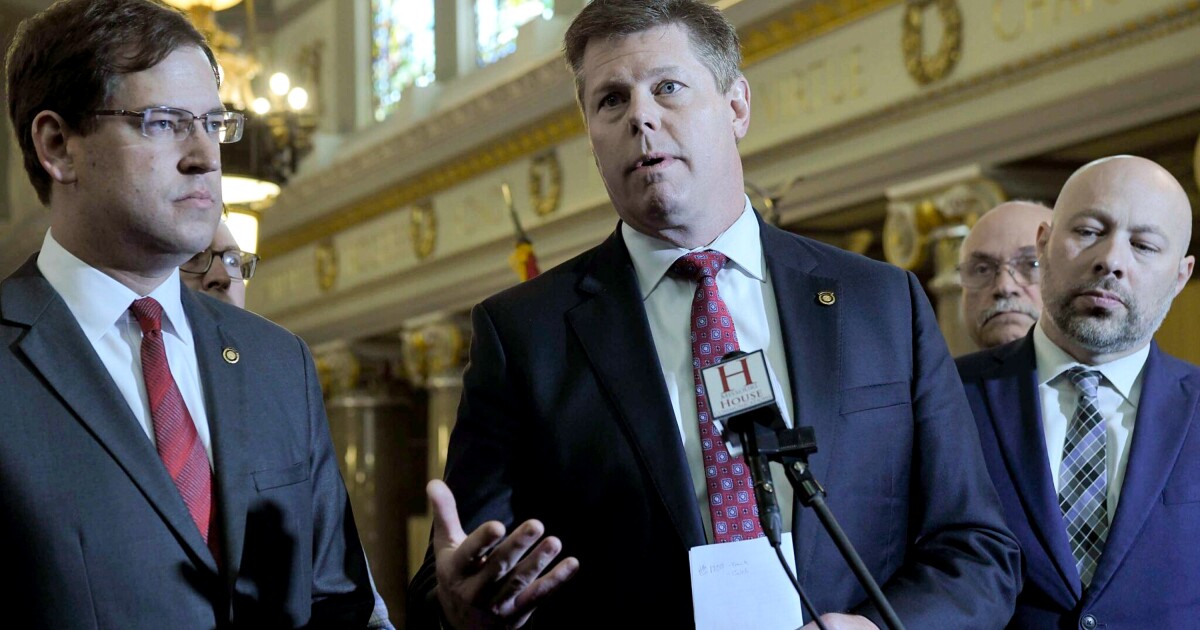Politics
St. Louis voters to decide on how to pay for sewer upgrades
Voters will decide on two ballot measures from the Metropolitan St. Louis Sewer District on April 2. The district covers the city and most of St. Louis County.Proposition W asks residents how the MSD should pay for federally mandated improvements to wastewater systems. Another, Proposition S, aims to increase funding for a new, first-in-the-region service.The utility provider needs more money for a $7.2 billion plan to meet clean water standards by 2039. The MSD is looking to pass a $750 million bond issue to fund the next four years of a plan to improve wastewater systems. A similar proposal failed to pass in 2019. Now, a revised version is on the ballot.If passed, Prop W will allow the MSD to sell bonds and spread out the cost of work. Residents will see rates increase by about 7% annually over the next four years. An average monthly bill would rise from about $61 in 2025 to about $75 in 2028. If voters decide against it, the MSD still plans to increase monthly rates — by more than 35% for the next two years. An average MSD bill would be more than $104 per month by 2026.“Prop W is just a question of how to pay for it. We don’t have a choice whether we do it or not,” said Brian Hoelscher, executive director and CEO of the MSD.The second ballot measure, Proposition S, asks residents to vote on a new property tax and an additional charge — one that might encourage storm-friendly landscaping. A similar proposal was rejected by voters in 2019. More than a year after a major flood, some residents still feel unsure about the proposal.“I do think we need more funds for stormwater, no question,’ said Jeff Hales, city council member in University City. “But what exactly is the maintenance program? You’re asking us to pay for an increase, and you have a whole list of projects. U City’s not on there.”Hales said homes in his neighborhood, University Heights, were badly damaged by a flood in July 2022. A tentative five-year plan for Prop S money doesn’t include maintenance on nearby stormwater tunnels.The $74.50 (per $100,000 assessed valuation) residential property tax would raise more than $35 million a year. For a home assessed at $200,000, the resident would pay an additional $150 in property taxes each year. If passed, Prop S would also enact a monthly charge for public and private, nonresidential properties with 1,000-plus square feet of impervious surfaces, like concrete and asphalt.Any qualifying property see an increase of $1.05 per month for every 1,000 square feet. Prop S would provide funding for the MSD to complete more than 500 stormwater improvement projects in St. Louis and St. Louis County by 2045.“When I talk to people, their main question is, are we ready for the spring?” said Trina Nelson, a Democratic candidate for state representative. “They’re traumatized. They don’t know if this data equates to the city being ready. How can we comfort them?”“If you got a storm like you got in 2022, it’s not going to matter from this point,” Hoelscher said.On July 26, 2022, it took just 12 hours to reach 25% of St. Louis’ average annual rainfall. Nelson said she hasn’t seen enough information to decide on Prop S, but she hopes to see a change before another flood comes.“It comes up before all the other issues, above abortion rights and everything. People are really traumatized by the flood,” Nelson said.
Politics
Washington University anti-war protest leads to over 80 arrests
Hundreds of Washington University campus community members and local activists demanded the private university stop investing in Boeing during a Saturday protest.The aerospace giant was targeted for its decades-long relationship with Israel, including making weapons used in the war in Gaza, and follows anti-war demonstrations on college campuses across the United States. In response, at least one university paused its relationship with Boeing.After several hours of marching and an attempt to set up an encampment, police deemed the protest held on private property illegal and arrested more than 80 people. Washington University officials said they all will be charged with trespassing, and of those, some will also be charged with resisting arrest and assault for injuring officers. Many of those detained were made to sign criminal trespass warnings that state they could be arrested if they returned to any of Wash U’s campuses.See photos from St. Louis Public Radio photojournalist Eric Lee below:
Eric Lee
/
St. Louis Public RadioA pro-Palestinian demonstrator holds a sign reading “Stop the Genocide” during a Saturday rally at Washington University.
Eric Lee
/
St. Louis Public RadioStudents work in the Olin Library as pro-Palestinian demonstrators rally on Saturday at Washington University.
Eric Lee
/
St. Louis Public RadioPro-Palestinian demonstrators hold a banner noting Palestinians killed during the war in Gaza on Saturday at Washington University.
Eric Lee
/
St. Louis Public RadioPresidential candidate Jill Stein, second from left, links arms with demonstrators including St. Louis Alderwoman Alisha Sonnier, second from right, and Board of Aldermen President Megan Green, far right, during a rally on Saturday at Washington University.
Eric Lee
/
St. Louis Public RadioMuslims pray during a pro-Palestine rally on Saturday at Washington University.
Eric Lee
/
St. Louis Public RadioPrisoner vans are readied as Muslims pray during a pro-Palestine rally on Saturday at Washington University.
Eric Lee
/
St. Louis Public RadioA pro-Palestinian demonstrator writes “WashU Divest” on a tent on Saturday at Washington University. Protestors marched through campus and set up an encampment in response to the university’s ties to Boeing, the supplier of many weapons to Israel used in the Gaza war.
Eric Lee
/
St. Louis Public RadioPro-Palestinian demonstrators who planned to stay in the encampment link arms on Saturday at Washington University.
Eric Lee
/
St. Louis Public RadioPro-Palestinian demonstrators hold each other on Saturday at Washington University.
Eric Lee
/
St. Louis Public RadioA St. Louis County police officer rams a bicycle into presidential candidate Jill Stein and other pro-Palestine demonstrators during a rally on Saturday at Washington University.
Eric Lee
/
St. Louis Public RadioSigns lay on the ground of a pro-Palestinian encampment on Saturday at Washington University.
Eric Lee
/
St. Louis Public RadioPolice forces face off with pro-Palestinian demonstrators during a rally on Saturday at Washington University.
Eric Lee
/
St. Louis Public RadioA St. Louis County police officer reaches for a taser during a pro-Palestine rally on Saturday at Washington University.
Eric Lee
/
St. Louis Public RadioA demonstrator is arrested by a Washington University officer on Saturday at the school’s campus.
Eric Lee
/
St. Louis Public RadioAnti-war demonstrators are arrested on Saturday at Washington University.
Eric Lee
/
St. Louis Public RadioPolice forces drag a demonstrator after they were arrested during a rally on Saturday at Washington University. Protestors marched through campus and set up an encampment in response to the university’s ties to Boeing, the supplier of many weapons to Israel used in the Gaza war.
Eric Lee
/
St. Louis Public RadioAnti-war protestors are arrested on Saturday at Washington University.
Eric Lee
/
St. Louis Public RadioProtestors are arrested on Saturday at Washington University.
Eric Lee
/
St. Louis Public RadioSt. Louis Alderwoman Alisha Sonnier, 7th Ward, argues with a University City police officer during a rally on Saturday at Washington University.
Eric Lee
/
St. Louis Public RadioAnti-war demonstrators attempt to hold their ground before being arrested on Saturday at Washington University.
Eric Lee
/
St. Louis Public RadioPolice officers arrest pro-Palestinian demonstrators during a rally on Saturday at Washington University.
Eric Lee
/
St. Louis Public RadioPolice forces arrest pro-Palestinian protestors during a demonstration on Saturday at Washington University.
Eric Lee
/
St. Louis Public RadioPolice forces arrest pro-Palestinian demonstrators during a protest on Saturday at Washington University.
Politics
Police arrest anti-war protestors at Washington University
Hundreds of Washington University campus community members and local activists demanded the private university stop investing in Boeing during a Saturday protest because it supplies weapons to Israel. They also called for an end to the years-long war in Gaza where in recent months, thousands have died from Israeli bombardments following the Oct. 7 attack by Hamas fighters.”End the siege on Gaza now,” the group chanted as they marched around the campus before setting up an encampment at the school’s Tisch Park. “Stop the killing. Stop the slaughter. Gaza must have food and water.”Police from across the region responded to the demonstration and about five hours declared it an unlawful gathering. Law enforcement officers later arrested dozens of protestors at the campus, throwing some to the ground. Jill Stein, a Green Party presidential hopeful in town for a campaign event, was briefly detained and then released.A Washington University spokeswoman said she would have a comment on Saturday’s events at a later time.Students at St. Louis-area universities have called on their administrations to cut ties with Boeing for months because of their ties to Israel. “We are calling on the university to divest from genocide,” said Penelope Thaman, a sophomore who was part of the protest.The demonstration at Washington University is part of a wave of demonstrations on college campuses across the United States, some of which have been met with forceful police tactics to control crowds.In St. Louis, the students and activists expressed outrage at the school’s response to an April 13 pro-Palestinian gathering on campus where police arrested 12 protestors and gave them summons to appear in court. Wash U officials suspended three students on the grounds they disrupted an on-campus event.
Eric Lee
/
St. Louis Public RadioPro-Palestinian demonstrators march on Saturday at Washington University.
Freedom of expressionMore than 130 students, faculty and staff signed a letter to Washington University leaders earlier this week criticizing the university for allegedly infringing on students’ freedom of speech.“No matter where one stands on the ongoing violence against Gaza or whether Boeing is a good associate for the university, one should be concerned that the attacks on freedom of speech and academic freedom have increased significantly in our country and on this campus,” the letter’s authors wrote.Michael Allen, an architecture professor at the school, echoed the letter’s sentiment, while emphasizing Wash U students are attempting to share their beliefs and that they should be allowed to do so — despite what their viewpoint may be. “As faculty, I feel obligated to stand for freedom of expression on campus,” he said. ”We love our students, and we want to see them enjoy their right to free speech on this campus.”At Saturday’s protest, students said they were frustrated with administrators who don’t appear to be interested in what students are trying to tell people about the war in Gaza and the plight of Palestinians. The arrests and suspensions after the earlier protests made that clear, students said.“The fact that it has happened before proves that the administration is not really interested in listening to student voices about any of these concerns,” said Max Franks, a Wash U junior, during the protest. “The administration is interested in protecting its image and its bottom line. So if we hope to achieve anything, those are the things that we need to interfere with.”
Politics
Missouri House ethics rule fixes on mind amid Plocher probe

The saga of Dean Plocher took yet another twist this week, with the House speaker’s leadership team circumventing the chamber’s rules to try to force the ethics committee to hold a hearing.Plocher has been under investigation by the committee for months, and recently he and his allies have started demanding it convene and dismiss the complaint against him. But because House rules only allow the chair of a committee to schedule a hearing, the meeting scheduled by GOP leadership was quickly scuttled.“The reason why I canceled the meeting is because I didn’t notice it up,” said state Rep. Hannah Kelly, a Mountain View Republican appointed last year by Plocher to serve as ethics chair. She ultimately ended up scheduling a meeting for 11 a.m. Monday.Plocher wouldn’t comment Thursday on what his role was in the push to force a meeting.But the unusual maneuver, coming as the speaker is already being accused of obstructing the committee’s work, has added even more fuel to questions about whether the ethics rules in the House need to be reworked in order to deal with the possibility of the chamber’s most powerful member being the focus of an investigation.“It is deeply difficult to hold elected officials accountable in the process that we have in this ethics committee, particularly when we’re talking about the speaker, who appoints those members and ultimately has authority over how that committee works. Whether or not subpoenas are issued, you know, and the list goes on,” said House Minority Leader Crystal Quade, a Springfield Democrat.House Majority Leader Jon Patterson, a Lee’s Summit Republican set to take over as speaker next year when Plocher’s term expires, agreed that changes to the ethics rules in light of everything that’s been going on this year are “worth looking at.”“There’s always room to look at things,” he said earlier this week, “and see how they can be improved as we go forward.”Since late last year, the ethics committee has been digging into Plocher’s unsuccessful push for the House to sign an $800,000 contract with a private software company outside the normal bidding process; alleged threats of retaliation against nonpartisan legislative staff who raised red flags about that contract; purported firing a potential whistleblower; and years of false expense reports for travelalready paid for by his campaign.Over the course of the ethics committee’s inquiry, Plocher refused to speak to the private attorney hired to gather evidence and on three occasions over March and April refused to sign off on subpoena requests by the committee.Kelly and the committee’s vice chair, Democratic state Rep. Robert Sauls of Independence, also accused Plocher of undermining the inquiry by pressuring potential witnesses.Last week, the committee voted 6-2 to reject a report recommending a formal letter of disapproval for Plocher, that he hire an accounting professional to manage his expense reports moving forward and that he refrain from retaliation against any legislator or House employee who cooperated with the committee.The rejected report also includes numerous suggested changes to the rules governing the ethics committee process. Among the changes would be transferring subpoena power automatically to another member of House leadership — the speaker pro tem — if the speaker or anyone on his staff are subject of an inquiry.The report also suggests strengthening the House policy protecting legislative employees from unlawful harassment and clarifying that the committee can investigate any alleged obstruction of one of its investigations.
Jason Hancock
/
Missouri IndependentDavid Steelman speaks to reporters on Tuesday in Jefferson City. Steelman is an ex-member of the University of Missouri Board of Curators was hired by House Speaker Dean Plocher as his attorney.
Plocher has insisted he can’t say anything while the investigation is ongoing.“I can’t comment on anything on ethics,” he told reporters Thursday. “I just can’t comment.”But his attorneys have not been nearly as hesitant to weigh in on the speaker’s behalf.On Tuesday, one of those attorneys — former member of the University of Missouri Board of Curators David Steelman — said there was nothing at all wrong with the House ethics rules.The problem, Steelman contends, was that Kelly and the committee didn’t follow them.“The rules work fine if the committee chairman would have applied them,” Steelman told reporters. “It was not the procedure that didn’t work. It was the chairman who ignored the procedure. That didn’t work.”The committee should have dismissed the complaint at the start of its inquiry in November, Steelman said, and throughout the process the committee seemed to be ignoring its mission and digging for dirt.After rejecting the draft report last week, the ethics committee has held no other meetings. Steelman says the committee has no choice but to convene and finish its work.“Dean Plocher,” Steelman said, “has a right to a resolution.”As speaker, Plocher also has the power to approve — or refuse to approve — subpoenas issued by the committee. And three times, the speaker’s office informed the committee he would not be granting its request.Steelman said Tuesday that two of the requested subpoenas were for Plocher and his chief of staff, Rod Jetton. They both agreed to testify willingly, so no subpoenas were needed.As for other requests, after roughly a month of resistance, Plocher eventually recused himself, allowing Speaker Pro Tem Mike Henderson to sign off on some of the subpoenas.When, exactly, Plocher decided to recuse himself remains unclear.Asked why Plocher didn’t recuse himself from the start of the investigation, or at least when subpoena requests started showing up to his office, Steelman told reporters the speaker recused himself “when it mattered.”Steelman did not respond to an email seeking details on when, exactly, Plocher recused himself from the committee’s subpoena process.Plocher also has the power to take away Kelly’s position on the ethics committee. He declined to answer whether he was considering that when asked about it at a recent press conference.As for this week’s kerfuffle over committee hearings, Marc Powers, chief of staff for the House Democrats, said Sauls was approached by the speaker’s office about convening a hearing and informed them that only Kelly had the authority to do that.However, Powers said Sauls doesn’t object to having another hearing in order to close the investigation for good.Regardless of how the Plocher saga turns out, any rule changes will have to wait until next year.House rules are proposed at the beginning of a General Assembly, which convenes the January after Election Day, and voted on by the entire chamber. They govern the House for two legislative sessions.Quade, who is running for governor and in her final term in the House, said the allegations coming out of the ethics committee against Plocher “are deeply concerning.”“There are conversations around potential obstruction,” she said. “There are conversations around employee treatment. There’s a lot of concerning pieces in there.”She hopes those who return next year will make the issue a priority.“I do hope that the members who will remain after my time here will look at what is the most effective way to hold folks accountable,” she said, “when they are doing something that violates our code of ethics.”This story was originally published by The Missouri Independent, part of the States Newsroom.
-

 Entertainment1 year ago
Entertainment1 year agoSt.Louis Man Sounds Just Like Whitley Hewsten, Plans on Performing At The Shayfitz Arena.
-

 Business1 year ago
Business1 year agoWe Live Here Auténtico! | The Hispanic Chamber | Community and Connection Central
-
Board Bills1 year ago
2022-2023 Board Bill 189 — Public Works and Improvement Program at the Airport
-

 Local News1 year ago
Local News1 year agoVIDEO: St. Louis Visitor Has Meltdown on TikTok Over Gunshots
-

 News1 year ago
News1 year agoTed Lasso-inspired pop-up bar now open in St. Louis
-

 Board Bills1 year ago
Board Bills1 year ago2022-2023 Board Bill 165 — Jefferson Arms Community Improvement District
-
Board Bills1 year ago
2022-2023 Board Bill 183 — Amending Ordinance Number 62885 known as the Capital Improvements Sales Tax
-
Board Bills1 year ago
2022-2023 Board Bill 180 — Right to Counsel for Tenants Facing Eviction





